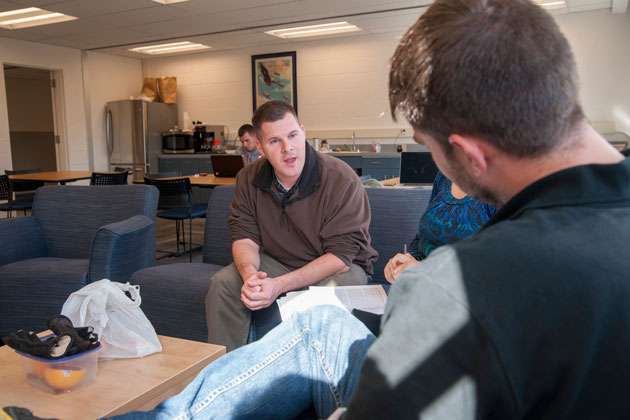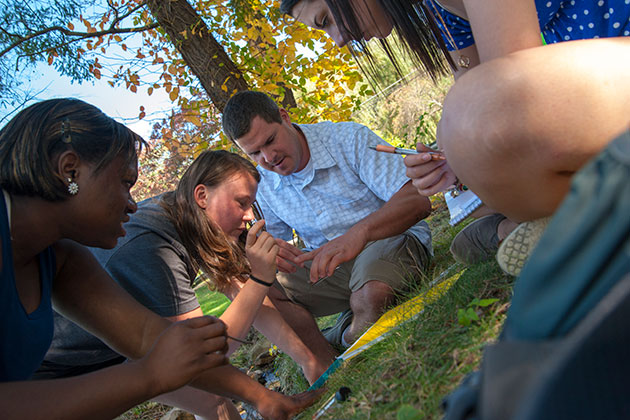
Not everyone has the mind for evaluating military strategy – least of all your typical 8-year-old. But Kevin Evringham ’10 (CLAS), ’12 MA recalls standing as a child alongside his father and staring out across the geography of a Civil War battlefield in Fredericksburg, Va., knowing where the Union general had gone wrong and why the battle had ended in disaster for his soldiers.
During his youth, Evringham visited every Civil War battlefield on the East Coast with his family. With his mother having served in the Marine Corps, and his grandfather and great-grandfather in the Navy, Evringham had a family tree rooted in a tradition of military service. So it came as no surprise to his parents when Evringham, still a junior in high school, signed up to join the Navy immediately upon graduation. “Ever since I was a kid, I wanted to go into the military,” he says. “That was never a question.”
Evringham spent three years working as a cryptographer in the Navy before he left the service just a few months before 9/11, and subsequently bounced around for the next few years in a dozen unsatisfying jobs in retail, security, and life insurance sales. With hopes of eventually completing an undergraduate degree, he considered a number of different career paths, taking a few classes at a community college in his home state of Florida. But returning in one form or another to his lifelong interest in the military held strong.
“If you’re not in the military, what can you do with the military?” Evringham asked himself. He realized that working in military policy was his ideal. “I thought of the job I would want to do in a perfect world, and that would be national security advisor. Who was a national security advisor? Condoleeza Rice. So I looked her up and what her education was. All of her background is essentially international relations.”
When his wife landed a faculty position at UConn’s School of Pharmacy, she and Evringham relocated to Connecticut. Approaching age 30, Evringham could finally start his college career in earnest. He earned a bachelor’s degree through the University’s individualized major program in international relations, followed by a master’s degree in geography. Even now, as he conducts research toward his third UConn degree – a Ph.D. in geography – his knack for seeing the big picture remains at the heart of his studies.
A New NATO?
Still drawn to the realms of military strategy and policy, Evringham has focused his doctoral work on security in East Asia, outlining the feasibility and potential benefit to the United States of establishing an East Asian NATO.
“Look 20 or 30 years down the road,” he says. “What’s the world going to look like in, say, 2040? Is the United States still going to be the global hegemon? Are we still going to be the No. 1 country? Many people will say no. Many people will say China is likely to be that country. … If so, would they do it well? Twenty-seven years from now, what is the world going to look like, and what would be in the best interests of the United States?”
Through interviews with government and military officials as well as archival research at such sites as the NATO Headquarters in Brussels and the National Archives in Washington, D.C., Evringham hopes to gain insight into the intricacies behind how NATO was formed in the wake of World War II – and what it might take to recreate that scenario today to form alliances with nations across East Asia.
“The United States currently maintains several bilateral treaties with states in East Asia. There’s a Japan-U.S. security treaty; a U.S.-South Korea security treaty; a U.S.-Philippines security treaty. Why not a U.S.-Korea-Japan-Philippines-Australia-Brunai treaty?” Evringham asks. “How do you make a roomful of states agree to cooperate, and how would that translate to East Asia?”
Getting Things Done
This past summer, after accepting an invitation to present his master’s thesis – focused on the U.S. military realignment on Okinawa, Japan – at a conference in Kyoto, Evringham spent a month exploring the continent that has been so important to his studies, stopping in such cities as Tokyo, Moscow, Beijing, and even Pyongyang, North Korea.

And yet he hasn’t stopped there. Outside of traveling, conducting doctoral research, serving as a teaching assistant, and raising his nearly 4-year-old daughter, he has also found at UConn a place where he can actively make a difference in the everyday lives of his fellow student veterans. Working in the University’s Office of Veteran Affairs and Military Programs, Evringham does everything from event planning to academic advising to outreach work for hundreds of student veterans across UConn’s campuses.
“If veteran students are having any issue at the University, they should come talk to us, whether it’s academic, financial, personal, a class, a professor, it doesn’t matter,” he says. “If there’s a problem, we’re here to fix it.”
It’s precisely this distinctive resolve to seek a solution to any challenge, no matter how complex the situation, that seems to define Evringham – from the work he does with veterans to the core premise behind his Ph.D. research.
As he puts it, “For most people, you learn discipline in the service and you learn to identify how to get things done. You find a way to put a square object into a round hole.”



